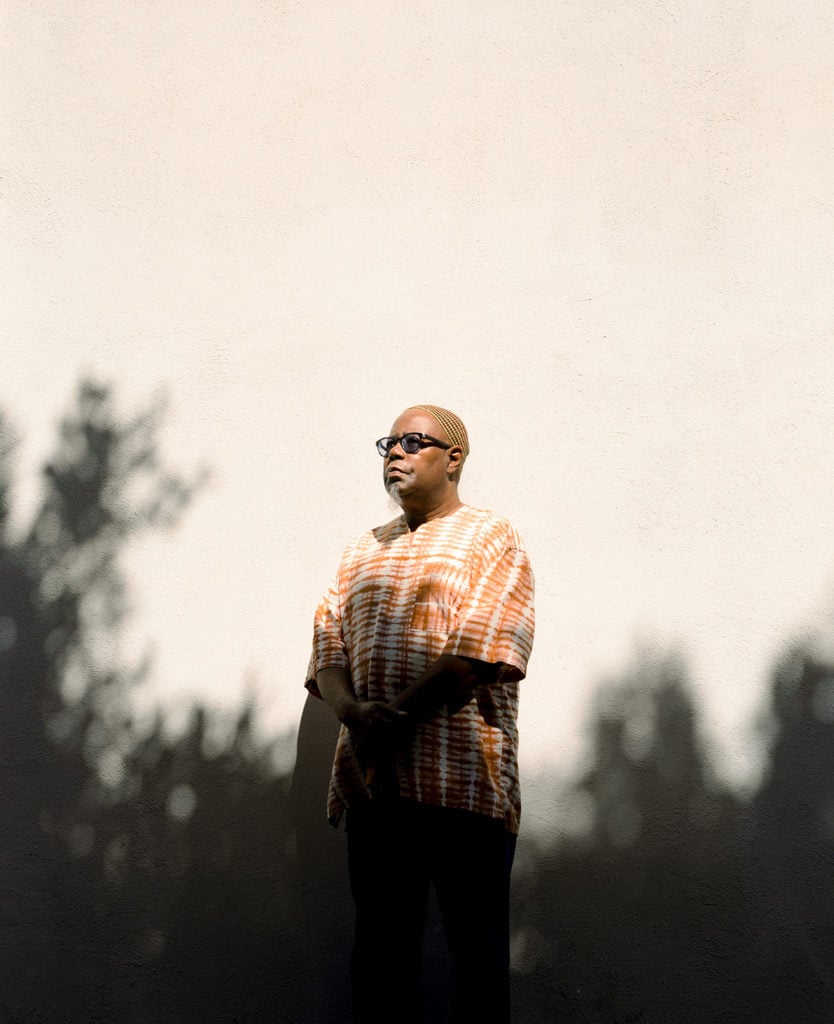 Dwight Trible has a big, warm house of a voice that can fill any particular sonic universe that needs filling, but it’s also supple and flexible enough to soar upward into airy flights of dreaminess and push past the barriers of space and time.
Dwight Trible has a big, warm house of a voice that can fill any particular sonic universe that needs filling, but it’s also supple and flexible enough to soar upward into airy flights of dreaminess and push past the barriers of space and time.
“Every day has a vibration that’s different than any other day,” the singer-lyricist says in a phone interview from his Mid-City home. Trible is talking about the improvisational nature of many of his concerts, and how each performance is intrinsically unique based on the sound and size of the room, the song choices, and the mood of the audience, among other factors.
The longtime L.A. resident moved here in 1976 after being born in Cincinnati and raised in that city’s West End. He declines to reveal his age and says instead, “I am in the eternal stream of consciousness where there is no young and there is no old.” His majestic voice is so prized that Trible is often asked to perform in a wide variety of settings, from the wildly improvisational sessions he prefers to more rigidly formal renditions of other musicians’ material. “When I start feeling restricted, the music shuts itself down,” he says. “People wanting things to be note for note, that’s not as enjoyable to me.”
When asked how to label his deep, resonant vocals, Trible demurs. “I don’t really classify it. Any note that I can hear, I should be able to do it,” he says, adding that labels are another kind of restriction that he’d rather avoid. “That’s becoming a common theme in this conversation,” Trible says about his disdain for restrictions. “It’s all about doing what the spirit gives me to sing. There are many notes standing out there like stars. There’s one that’s the brightest star, and you go for that one.”
Discussing his collaborations with the brilliant jazz saxophonist Pharoah Sanders, Trible says, “Of course, I’m honored that [people like Sanders] would want to work with me. I just feel that if I’m a musician, I should be able to take the music inside of me to create another flavor in the soup. The combination between Dwight and Pharoah … when we start doing it, we don’t have any reservations or restrictions.”
Throughout his extensive career, Trible has worked with such stellar figures as Kenny Garrett, Charles Lloyd, Harry Belafonte, Kamasi Washington, Della Reese, Oscar Brown Jr., Billy Higgins and Kamau Daáood. His Cosmic Vibrations ensemble includes such heavy friends as percussionists Derk Reklaw, Breeze Smith and Christopher Garcia, bassist John B. Williams, and flutist Pablo Calogero.

Dwight Trible (Danny Liao)
But Trible’s style was considered so unusual at first that it took awhile before his music found traction. “Early on, people hated what I did,” Trible recalls. “I didn’t really sound like anybody. [Pan Afrikan Peoples Arkestra pianist-composer] Horace Tapscott gave me credibility. It took someone like Horace to legitimize me.”
Unlike many veteran jazz musicians, Trible embraces rap and hip-hop, citing his admiration for L.A. rap wordsmith Busdriver, Freestyle Fellowship’s Myka 9 and influential drummer-producer Darryl Moore. “If you listen to rappers … it’s almost like being an improviser with an instrument because it’s all about rhythm. I’ve learned so much from them about cadence and rhythm. It’s so much more advanced than singers.”
Trible’s ambitious 2019 release, Mothership, is a quintessential, forward-looking album that invokes themes of maternal love, family and transcendent spirituality. The record includes a propulsive and tripped-out interpretation of The Beatles’ “Tomorrow Never Knows.”
“I hadn’t heard it before,” he says about the original version. “One day, I was watching a TV program [and heard it], and I said, ‘What is that?!’ … It sounded like a Dwight song to me. I love the lyric of it. I love the music — it’s funky, it’s expansive, it leaves room for the song to go anywhere.”
Trible has long used the World Stage — the Leimert Park performance space founded by poet Kamau Daáood and the late drummer Billy Higgins — as a launching pad for his more free-flowing explorations. “I have been intimately involved since the beginning … I’m the executive director and janitor and the art director and MC, the on-call performer. I do the booking. You might see me sweeping the alley or cleaning the toilet. Or onstage.”
Advertising disclosure: We may receive compensation for some of the links in our stories. Thank you for supporting LA Weekly and our advertisers.

